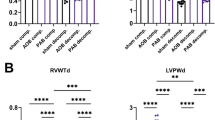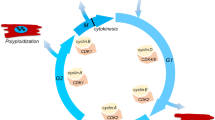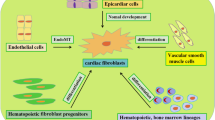Abstract
Objective
A large number of diverse signaling molecules in cell and animal models participate in the stimulus-response pathway through which the hypertrophic growth of the myocardium is controlled. However, the mechanisms of signaling pathway including the influence of lithium, which is known as an inhibitor of glycogen synthase kinase-3β, in pressure overload hypertrophy remain unclear. The aim of our study was to determine whether glycogen synthase kinase-3β inhibition by lithium has acute effects on the myocyte growth mechanism in a pressure overload rat model.
Methods
First, we created a rat model of acute pressure overload cardiac hypertrophy by abdominal aortic banding. Protein expression time courses for β-catenin, glycogen synthase kinase-3β, and phosphoserine9-glycogen synthase kinase-3β were then examined. The rats were divided into four groups: normal rats with or without lithium administration and pressure-overloaded rats with or without lithium administration. Two days after surgery, Western blot analysis of β-catenin, echo-cardiographic evaluation, left ventricular (LV) weight, and LV atrial natriuretic peptide mRNA levels were evaluated.
Results
We observed an increase in the level of glycogen synthase kinase-3β phosphorylation on Ser 9. A significant enhancement of LV heart weight (P < 0.05) and interventricular septum and posterior wall thickness (P < 0.05) with pressure-overloaded hypertrophy in animals treated with lithium were also observed. Atrial natriuretic peptide mRNA levels were significantly increased with pressure overload hypertrophy in animals treated with lithium.
Conclusions
We have shown in an animal model that inhibition of glycogen synthase kinase-3β by lithium has an additive effect on pressure overload cardiac hypertrophy.
Similar content being viewed by others
References
Akazawa H, Komuro I. Roles of cardiac transcription factors in cardiac hypertrophy. Circ Res 2003;92:1079–1088.
Olson EN, Schneider MD. Sizing up the heart: development redux in disease. Genes Dev 2003;17:1937–1956.
Molkentin JD. Calcineurin-NFAT signaling regulates the cardiac hypertrophic response in coordination with the MAPKs. Cardiovasc Res 2004;63:467–475.
Antos CL, McKinsey TA, Frey N, Kutschke W, McAnally J, Shelton JM, et al. Activated glycogen synthase-3beta sup-presses cardiac hypertrophy in vivo. Proc Natl Acad Sci U S A 2002;99:907–912.
Haq S, Michael A, Andreucci M, Bhattacharya K, Dotto P, Walters B, et al. Stabilization of β-catenin by a Wnt-independent mechanism regulates cardiomyocyte growth. Proc Natl Acad Sci U S A 2003;100:4610–4615.
Brancaccio M, Fratta L, Notte A, Hirsch E, Poulet R, Guazzone S, et al. Melusin, a muscle-specific integrin β1-interacting protein, is required to prevent cardiac failure in response to chronic pressure overload. Nat Med 2003;9:68–75.
Hardt SE, Tomita H, Katus HA, Sadoshima J. Phosphorylation of eukaryotic translation initiation factor 2B epsilon by glycogen synthase kinase-3β regulates β-adrenergic cardiac myocyte hypertrophy. Circ Res 2004;94:926–935.
Haq S, Choukroun G, Kang ZB, Ranu H, Matsui T, Rosenzweig A, et al. Glycogen synthase kinase-3β is a negative regulator of cardiomyocyte hypertrophy. J Cell Biol 2000;151:117–129.
Kuriyama M, Matsushita M, Tateishi A, Moriwaki A, Tomizawa K, Ishino K, et al. A cell-permeable NFAT inhibitor peptide prevents pressure-overload cardiac hypertrophy. Chem Biol Drug Des 2006;67:238–243.
Hirotani S, Zhai P, Tomita H, Galeotti J, Marquez JP, Gao S, et al. Inhibition of glycogen synthase 3β during heart failure is protective. Circ Res 2007;101:1164–1174.
Baurand A, Zelarayan L, Betney R, Gehrke C, Dunger S, Noack C, et al. β-Catenin downregulation is required for adaptive cardiac remodeling. Circ Res 2007;100:1353–1362.
Michael A, Haq S, Chen X, Hsich E, Cui L, Walters B, et al. Glycogen synthase kinase-3β regulates growth, calcium homeostasis, and diastolic functions in the heart. J Biol Chem 2004;279:21383–21393.
Author information
Authors and Affiliations
Corresponding author
Rights and permissions
About this article
Cite this article
Tateishi, A., Matsushita, M., Asai, T. et al. Effect of inhibition of glycogen synthase kinase-3 on cardiac hypertrophy during acute pressure overload. Gen Thorac Cardiovasc Surg 58, 265–270 (2010). https://doi.org/10.1007/s11748-009-0505-2
Received:
Accepted:
Published:
Issue Date:
DOI: https://doi.org/10.1007/s11748-009-0505-2




